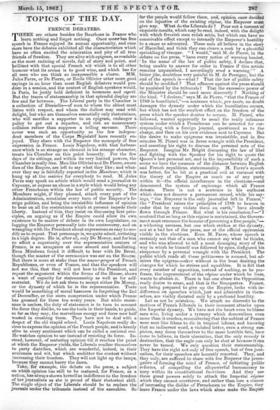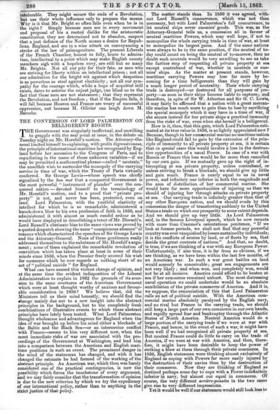TOPICS OF THE DAY.
FRENCH DEBATERS.
!THYME are others besides the Bourbons in Prance who learn nothing and forget nothing. Once monehas free speech in France enjoyed its annual opportunity, and once more have the debates exhibited all the characteristics which have so often excited the admiration and pity of all true friends of freedom. They are alive With epigram, as readable as the most enticing of novels, full of story and point, and brilliant with that special French wit- which is to all other humour what its aroma is to good wine, and which has for all men who can think so inexpressible a- charm. MM. Jules Favre, or Be Pierre, or Emile 011ivier utter more good sayings in an hour than most English debaters would pro.. duce in a session, and the neatest of English speakers would, in Paris, be justly held deficient in terseness and eeprit. But the traces of statesmanship in that splendid display are few and far between. The Liberal party in the Chamber is a collection of Disrielis—of men to whom the ablest must listen with respect, and whom the dullest may read with delight, but who are themselves essentially only rhetoricians, who will sacrifice a supporter to an epigram, endanger a policy to get out a repartee, and risk an unnecessary collision rather than suppress a telling sarcasm. There never was each an opportunity as the few indepen- dent members of the Corps Ngislatif have recently en- joyed. They share with the Emperor the monopoly of free expression in France. Louis Napoleon, with that forbear- ance which is so strange an element in his strange character, treats his Chamber on this point honestly. For the few days of its sittings, and within its very limited powers, the Chamber is really free. Men like 011ivier and Be Pierre, sworn foes of the Empire, are left to say what they like ; and what- ever they say is faithfully reported in the 2fonitewr, which is hung up at the mairies for everybody to read. M. _Jules Fevre may speak an article which would send a journalist to Cayenne, or expose an abuse in a style which would bring any other Frenchman within the law of public security. The Members might, if they pleased, attack every part of the Administration, scrutinize every turn of the Emperor's fo- reign politics, and bring the irresistible influence of opinion to bear on all the restrictions which at present impede their liberty. Instead of this, they insist on discussing first prin- ciples on arguing as if the Empire could allow its own existence to be matter of debate in its own Legislature, on lugging the Emperor personally into the controversy, and on wrangling with the President about expressions as easy to mo- dify as to repeat. That personage is, we quite admit, irritating in a high degree. Ile is, after all, only Be Moray, and for him to affect a superiority over the representative orators of France, is an arrogance at once absurd and humiliating. Even Mirabeau found it difficult to bear with Be Breze, though the master of the ceremonies was not on the Bourse. But there is more at stake than the amour-propre of French Republicans, or even of France, and that the speakers will not see this, that they will not bow to the President, and repeat the argument within the forms of the House, shows a want of capacity for statesmanship as well AS for self- restraint. We do not ask them to accept either Be Moray, or the dynasty of which he is the representative. There would be something of moral baseness in forgetting the 2nd of Decemlier, or the stern compression under which France has groaned for these ten weary years. But while resist- ance is useless, the duty of statesmen is to turn to account the force they dislike, to use the tools in their hands, to guide, so far as they may, the marvellous energy and force now half wasted in crushing them. They have not to deal with a despot of the old stupid school. Louis Napoleon really de- sires to express the opinion of the French people, and is keenly alive to every sentiment which can be called a national one. He watches opinion to use instead of resisting its force. In- stead, however, of maturing opinion till it reaches the point at which the Emperor yields, the Liberals confine themselves to party diatribes, which are wonderful, indeed, in their acuteness and wit, but which embitter the contest without increasing their freedom. They will not light up the lamps, because they cannot hurry the dawn. Take, for example, the debate on the press, a subject on which opinion has still to be matured, for France, as a nation, has always shown herself as indifferent to the freedom of her journalists as she is proud of their rhetorical skill. The single object of the Liberals should be to replace the journals under the tribunals instead of the executive. So fat the people would follow them, and, opinion once decided on the injustice of the existing riyinte, the Emperor must give way. What do the Liberals do ? Pour out a torrent of exquisite insults, which may be read, indeed, with the delight with which feverish men relish acids, but which can have no conceivable effect except to intensify the Emperor's hostility, to a cause so advocated. These men all believe in the story of Hannibal, and think they can cleave a rock by a plentiful sprinkling et' vinegar. "I would," said M. de Pierre, in the debate on the press, "have every notice of warning headed, 'In the name of the law of public safety, I declare that, being unable to answer for order in France if this article remains unpunished, I accordingly send a warning.'" bitter jibe, doubtless very painful to M. de Persigny, but the end of the speech is—what ? That the law of public safety- should be modified ? That offences against the press should be punished by the tribunals ? That the excessive power of the Minister should be used more discreetly ? Nothing of the kind. "I declare," says M. de Pierre, "that the Prance of 1789 is humiliated,"—a sentence which, pro taste, no doubt damages the dynasty under which the humiliation occurs, but Which has not the smallest effect on the freedom of the press which the speaker desires to secure. M. Picard, who followed, wanted apparently to assail the really infamous system under which a Frenchman can be arrested for cor- responding with a foreign journal, questioned as to the charge, and then on his own evidence sent to Cayenne. Rut the desire to make epigrams was irresistible, and in five minutes M. Picard was in fierce wrangle with the President, and asserting his right to discuss the personal acts of the Emperor. Imagine Mr. Bright discussing the law of libel and fighting with the Speaker for his right to quote the Queen's last personal act, and in the impossibility of such a scene we have the measure of the distance between English and French republican statesmanship. M. Favre's speech was better, for he hit at a practical evil at variance with the theory of the Empire as much as of any party within it—the official interference in the elections—and denounced. the system of espionage which all France detests. There is not a sentence in his outburst which does not deserve a permanent record, while his say- ings, "the Emperor is the only journalist left in France," the "President raises the principles of 1789 to heaven in order that he may violate them on earth," have already flown through France. But what is his conclusion ?—" I contend that so long as this re'gime is maintained, the Govern- ment must renounce the honour of governing a free people,"-- a withering sarcasm, but one which strikes at the dynasty, not at A bad law of the press, nor at the official oppression visible in the elections. Even M. Fevre, whose speech is certainly not that of a man who cannot say what he thinks, and who was allowed to tell a most damaging story of' the way in which he himself was followed by spies, disfigured his eloquence by a personal wrangle with the President. The public which reads all these pettinesses is amused, but ad- mires the epigram-maker without in the least desiring the changes for which he strives and squabbles. It is felt that every member of opposition, instead of seeking, as he pro- fesses, the improvement of the regime under which he lives, wants to abolish it. There is but one abuse the Opposition really desire to erase, and that is the Bonapartes. France, not being prepared to give up the Empire, looks with in- difference on speeches which, just and admirable in them- selves, are visibly dictated only by a profound hostility. Let us not be mistaken. We attach no discredit to the motives of French Liberals in their incessant attacks upon the Imperial dynasty. We have not the heart even to blame men who, living under a tyranny which demoralizes even more than it crushes, remembering that the noblest of France were sent like felons to die in tropical labour, and knowing that an indiscreet word, a violated letter, even a strong sus- picion, may doom themselves to the same horrible fate, have come to believe, in their ulceration, that the only remedy is destruction, that the eagle can only be shot at because it can never be tamed. We only question their statesmanship. They have the right not only of free speech, but of free jour- nalism, for their speeches are honestly reported. They, and they only, are suffered to share with the Emperor the prero- gative of forming the mind of France, of initiating public reforms, of compelling the all-powerful bureaucracy to keep within its constitutional functions. And they use these great powers solely to attack the Imperial regime which they cannot overthrow, and rather than lose a chance of increasing the dislike of Frenchmen to the Empire, they leave France under the laws which alone make the Empire































 Previous page
Previous page